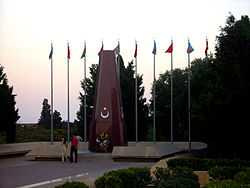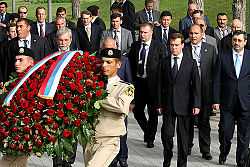Martyrs' Lane
| Martyrs' Lane | |
|---|---|
| Azerbaijani State Government | |
|
View of the cemetery from the memorial. | |
|
Used for those deceased Russian civil war 1990 - 1994 | |
| Established | January 19, 1990 |
| Location |
40°21′28.5″N 49°49′37.5″E / 40.357917°N 49.827083°ECoordinates: 40°21′28.5″N 49°49′37.5″E / 40.357917°N 49.827083°E near Baku, Azerbaijan |
| Total burials | 15,000 |
| Burials by nation | |
| |
| Burials by war | |
| |
| Statistics source: Victims of The Black January | |
Martyrs' Lane, Alley of Martyrs or Şəhidlər Xiyabanı (transliterated to Shehidler Khiyabani), formerly The Kirov Park, is a cemetery and memorial in Baku, Azerbaijan dedicated to those killed by the Soviet Army during Black January and later to those killed in Nagorno-Karabakh War.
History
In the closing days of World War I fighting broke up as a result of Russian Civil War. Four groups fought for control of the area when the Russian Empire collapsed. Fighting each other were the Bolsheviks, Mensheviks, Armenians and Azeris. Many people were killed in the fighting including men from a small British force sent to prevent Baku falling into the hands of the Ottomans or the Germans.[1]
The site first served as former Muslim cemetery, where they buried the bodies of victims of the March Events of 1918 which was a part of the localized fighting of the Russian Civil War.[2][3]
The cemetery was completely destroyed and the corpses removed from there after the Bolsheviks came to power, who created an amusement park and installed a statue of Sergei Kirov, the prominent Bolshevik leader.[4] After the collapse of the Soviet Union, the statue as well as park amusement facilities were removed and the location was reinstated as a burial site for national heroes.[5] Some of its first men who were honoured by the newly instated memorial were those that died during Black January events of 1990 when Soviet forces invaded Baku.[2]
The memorial was again used for men who died in the Nagorno-Karabakh War, an armed conflict that took place from February 1988 to May 1994, in the small enclave of Nagorno-Karabakh in southwestern Azerbaijan, between the majority ethnic Armenians of Nagorno-Karabakh backed by the Republic of Armenia, and the Republic of Azerbaijan.[2]
Design
It's estimated that about 15,000 people are buried in the cemetery. It is located on a hill in the south of the city and offers views of the Caspian Sea. Thousands visit the shrine to pay their respects to those who had given their lives for Azerbaijan's independence.[6]
Memorials

The Eternal Flame memorial at Martyrs' lane often covered by wreaths is usually attended by many presidents and dignitaries of Baku.[7]
Martyrs' Lane is also home to Baku Turkish Martyrs' Memorial, the large memorial to the 1,130 Turkish troops, which were killed while fighting Bolshevik and Armenian forces in the Battle of Baku in 1918. Next to the memorial there is a Martyrs mosque also built by Turks.[8] The memorial contains a hexagonal block cladded by red granite and at each face, a pure white marble crescent-star from Turkish national flag had fitted within and unveiled by the former Turkish president Süleyman Demirel and Azerbaijani President Heydar Aliyev with a prestigious ceremony in September, 1999.[9]
Not far from the Turkish memorial there is a small wall acknowledging the British soldiers killed in the same conflict.[5][1]
Notable burials
Other frequently visited sites in the cemetery include the graves of the journalists Chingiz Mustafayev and Salatyn Asgarova, who were killed in Nagorno-Karabakh war.[10]
The first tomb in the entrance of Martyrs' Lane belongs to married couple Fariza and Ilham Allahverdiyev who died during Black January. Ilham was shot dead by Soviet troops and Fariza committed a suicide in two attempts after hearing about the death of her husband..[11][12] Today, for the Azerbaijani youth their tomb become a symbol of fidelity and love, while every year the tomb visited by the crowds of lovers.[13]
Gallery
-

President Vladimir Putin laying a wreath to the memorial.
-

President Dmitry Medvedev laying a wreath on the Eternal Flame monument.
-

President Dmitry Medvedev at the monument to fallen heroes.
-
Memorial to the British soldiers.
See also
References
- ↑ 1.0 1.1 1.2 "History denies Baku heroes a memorial". The Times. January 14, 2003. Retrieved March 25, 2010.
- ↑ 2.0 2.1 2.2 "Şəhidlər xiyabanı ziyarət edilib" (in Azerbaijani). islammektebi.org. January 18, 2010. Retrieved March 25, 2010.
- ↑ "Baku Attractions: Martyrs Lane". simplebaku.com. 2010. Retrieved March 25, 2010.
- ↑ Память об утратах и азербайджанское общество (in Russian). sakharov-center.ru. 2010. Retrieved March 25, 2010.
- ↑ 5.0 5.1 Peuch, Jean-Christophe (September 20, 2003). "Azerbaijan: Planned British War Memorial Raises Hackles". NetNative. Payvand's Iran News. Retrieved March 25, 2010.
- ↑ "QARA YANVAR: Tragedy of January 20 Remembered". zerbaijan.com. 2010. Retrieved March 25, 2010.
- ↑ На Аллее Шехидов в Баку вновь зажегся Вечный огонь05.11.2007 20:35 (in Russian). mirtv.ru. May 11, 2007. Retrieved March 25, 2010.
- ↑ "Azerbaijan closes Turkish mosque in Baku: Report". Sitemiz AA, CÄ°HAN ve Reuters abonesidir. April 26, 2009. Retrieved March 25, 2010.
- ↑ "Memorial for Turkish Martyries and territorial planning project, Baku-Azerbaijan 1999". utm.com.tr. 2010. Retrieved March 25, 2010.
- ↑ Təsisçilər Şurası (Azerbaijani)
- ↑ Январский террор проармянской советской власти и непоколебимость героизма азербайджанского народа (Russian)
- ↑ Аллахвердиев Ильгам Аждар оглы, 1962 года рождения (Russian)
- ↑ В Азербайджане вспоминают жертв трагедии 20 января 1990 года (Russian)

